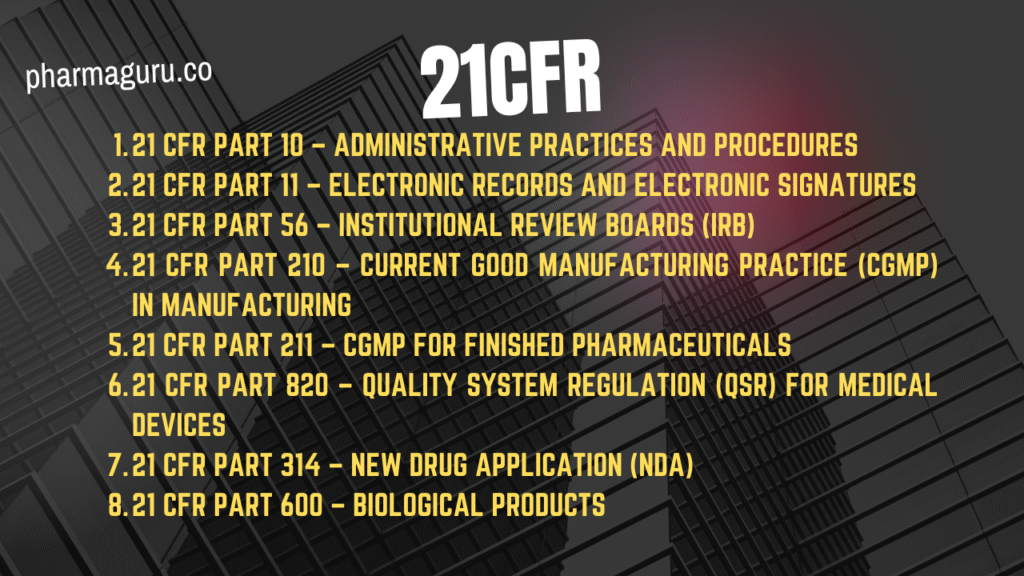21 CFR (Title 21 of the Code of Federal Regulations) is the section of U.S. federal law that outlines FDA-enforced rules and guidelines for the regulation of food, drugs, medical devices, and related products. In the pharmaceutical and medical device industries, regulatory compliance isn’t merely a best practice—it’s a legal requirement. The U.S. Food and […]
21 CFR (Title 21 of the Code of Federal Regulations) is the section of U.S. federal law that outlines FDA-enforced rules and guidelines for the regulation of food, drugs, medical devices, and related products.
In the pharmaceutical and medical device industries, regulatory compliance isn’t merely a best practice—it’s a legal requirement. The U.S. Food and Drug Administration (FDA) enforces a comprehensive set of standards outlined in Title 21 of the Code of Federal Regulations (CFR), designed to ensure product quality, safety, and efficacy. Among these, Parts 10, 11, 56, 210, 211, and 820 are particularly crucial for pharmaceutical companies and medical device manufacturers.
In this article, I will provide a comprehensive overview of these key CFR parts and their significance in the pharmaceutical sector.
Major Takeaway
21 CFR refers to Title 21 of the Code of Federal Regulations, which deals with food and drugs regulated by the FDA. It outlines the requirements for manufacturing, processing, packaging, testing, storing, and distributing pharmaceuticals and medical devices in the U.S.
21 CFR Part 11 governs the use of electronic records and electronic signatures to ensure they are trustworthy, reliable, and equivalent to paper records.
21 CFR compliant means adhering to the regulations set by the FDA under Title 21 of the Code of Federal Regulations, ensuring that products like drugs, medical devices, and electronic records meet standards for safety, quality, and integrity.
FDA 21 CFR 820 is the Quality System Regulation (QSR) that outlines the requirements for medical device manufacturers to ensure their products are consistently designed and produced to meet quality and safety standards.

21 CFR refers to Title 21 of the Code of Federal Regulations, which deals with food and drugs regulated by the FDA. It outlines the requirements for manufacturing, processing, packaging, testing, storing, and distributing pharmaceuticals and medical devices in the U.S.
You may like:
This part lays down the rules for petitions, public hearings, and general rulemaking procedures. It is essential for stakeholders who wish to:
Relevance in Pharma: It allows companies to interact formally with the FDA regarding regulatory decisions or proposed changes.
Part 11 governs the use of electronic records and electronic signatures to ensure they are trustworthy, reliable, and equivalent to paper records.
Relevance in Pharma: Vital for ensuring data integrity in electronic documentation, especially in quality systems, clinical trials, and manufacturing.
This part outlines the requirements for Institutional Review Boards, which are responsible for protecting the rights and welfare of human subjects involved in clinical trials.
Relevance in Pharma: Critical for companies conducting clinical trials involving human subjects, especially during the development of new drugs or biologics.
Part 210 provides general provisions on cGMP applicable to all pharmaceutical products.
Core Areas:
Relevance in Pharma: Acts as a foundation for maintaining consistent product quality across all manufacturing stages.
This is a more detailed regulation building on Part 210, specifically for finished drug products.
Key Areas Covered:
Relevance in Pharma: Essential for ensuring that drugs are produced consistently and meet quality standards before reaching the market.
Though focused on medical devices, this regulation is often relevant to combination products (e.g., drug-device products).
It Covers:
Relevance in Pharma: Pharmaceutical companies that produce drug-device combination products must comply with both drug and device regulations, including Part 820.
Understanding and complying with these key parts of 21 CFR is crucial for pharmaceutical and medical device companies to ensure regulatory compliance, maintain product quality, and safeguard public health. Whether it’s electronic data (Part 11), manufacturing practices (Parts 210 and 211), or clinical trials (Part 56), each regulation serves a distinct purpose in the complex pharma regulatory landscape.
Staying updated with these requirements—and integrating them into your quality and compliance strategies—is not just regulatory good sense, but a competitive advantage.
Further Reading
Quick Links